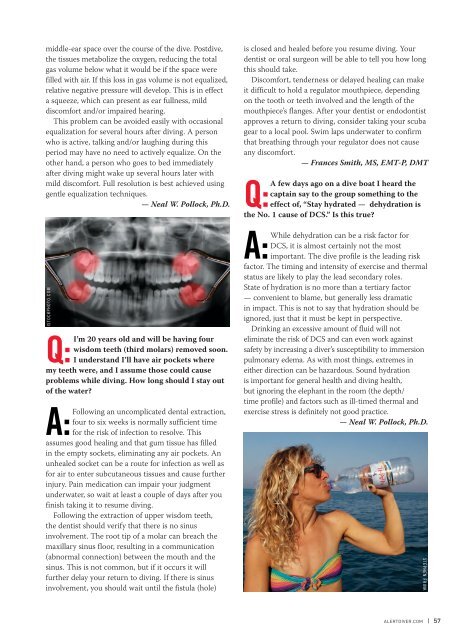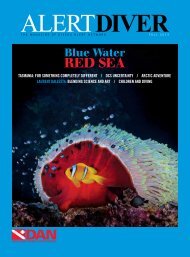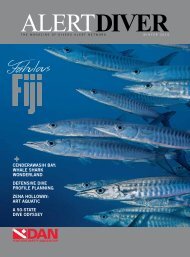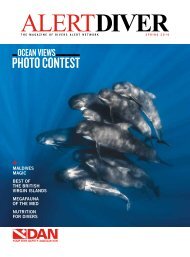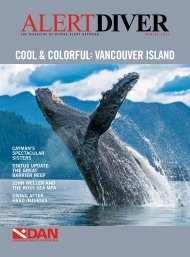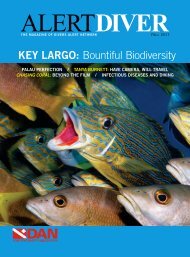AD 2017 Q3
Alert Diver is the dive industry’s leading publication. Featuring DAN’s core content of dive safety, research, education and medical information, each issue is a must-read reference, archived and shared by passionate scuba enthusiasts. In addition, Alert Diver showcases fascinating dive destinations and marine environmental topics through images from the world’s greatest underwater photographers and stories from the most experienced and eloquent dive journalists in the business.
Alert Diver is the dive industry’s leading publication. Featuring DAN’s core content of dive safety, research, education and medical information, each issue is a must-read reference, archived and shared by passionate scuba enthusiasts. In addition, Alert Diver showcases fascinating dive destinations and marine environmental topics through images from the world’s greatest underwater photographers and stories from the most experienced and eloquent dive journalists in the business.
Create successful ePaper yourself
Turn your PDF publications into a flip-book with our unique Google optimized e-Paper software.
middle-ear space over the course of the dive. Postdive,<br />
the tissues metabolize the oxygen, reducing the total<br />
gas volume below what it would be if the space were<br />
filled with air. If this loss in gas volume is not equalized,<br />
relative negative pressure will develop. This is in effect<br />
a squeeze, which can present as ear fullness, mild<br />
discomfort and/or impaired hearing.<br />
This problem can be avoided easily with occasional<br />
equalization for several hours after diving. A person<br />
who is active, talking and/or laughing during this<br />
period may have no need to actively equalize. On the<br />
other hand, a person who goes to bed immediately<br />
after diving might wake up several hours later with<br />
mild discomfort. Full resolution is best achieved using<br />
gentle equalization techniques.<br />
— Neal W. Pollock, Ph.D.<br />
ISTOCKPHOTO.COM<br />
Q:<br />
I’m 20 years old and will be having four<br />
wisdom teeth (third molars) removed soon.<br />
I understand I’ll have air pockets where<br />
my teeth were, and I assume those could cause<br />
problems while diving. How long should I stay out<br />
of the water?<br />
A:<br />
Following an uncomplicated dental extraction,<br />
four to six weeks is normally sufficient time<br />
for the risk of infection to resolve. This<br />
assumes good healing and that gum tissue has filled<br />
in the empty sockets, eliminating any air pockets. An<br />
unhealed socket can be a route for infection as well as<br />
for air to enter subcutaneous tissues and cause further<br />
injury. Pain medication can impair your judgment<br />
underwater, so wait at least a couple of days after you<br />
finish taking it to resume diving.<br />
Following the extraction of upper wisdom teeth,<br />
the dentist should verify that there is no sinus<br />
involvement. The root tip of a molar can breach the<br />
maxillary sinus floor, resulting in a communication<br />
(abnormal connection) between the mouth and the<br />
sinus. This is not common, but if it occurs it will<br />
further delay your return to diving. If there is sinus<br />
involvement, you should wait until the fistula (hole)<br />
is closed and healed before you resume diving. Your<br />
dentist or oral surgeon will be able to tell you how long<br />
this should take.<br />
Discomfort, tenderness or delayed healing can make<br />
it difficult to hold a regulator mouthpiece, depending<br />
on the tooth or teeth involved and the length of the<br />
mouthpiece’s flanges. After your dentist or endodontist<br />
approves a return to diving, consider taking your scuba<br />
gear to a local pool. Swim laps underwater to confirm<br />
that breathing through your regulator does not cause<br />
any discomfort.<br />
— Frances Smith, MS, EMT-P, DMT<br />
Q:<br />
A few days ago on a dive boat I heard the<br />
captain say to the group something to the<br />
effect of, “Stay hydrated — dehydration is<br />
the No. 1 cause of DCS.” Is this true?<br />
A:<br />
While dehydration can be a risk factor for<br />
DCS, it is almost certainly not the most<br />
important. The dive profile is the leading risk<br />
factor. The timing and intensity of exercise and thermal<br />
status are likely to play the lead secondary roles.<br />
State of hydration is no more than a tertiary factor<br />
— convenient to blame, but generally less dramatic<br />
in impact. This is not to say that hydration should be<br />
ignored, just that it must be kept in perspective.<br />
Drinking an excessive amount of fluid will not<br />
eliminate the risk of DCS and can even work against<br />
safety by increasing a diver’s susceptibility to immersion<br />
pulmonary edema. As with most things, extremes in<br />
either direction can be hazardous. Sound hydration<br />
is important for general health and diving health,<br />
but ignoring the elephant in the room (the depth/<br />
time profile) and factors such as ill-timed thermal and<br />
exercise stress is definitely not good practice.<br />
— Neal W. Pollock, Ph.D.<br />
STEPHEN FRINK<br />
ALERTDIVER.COM | 57


